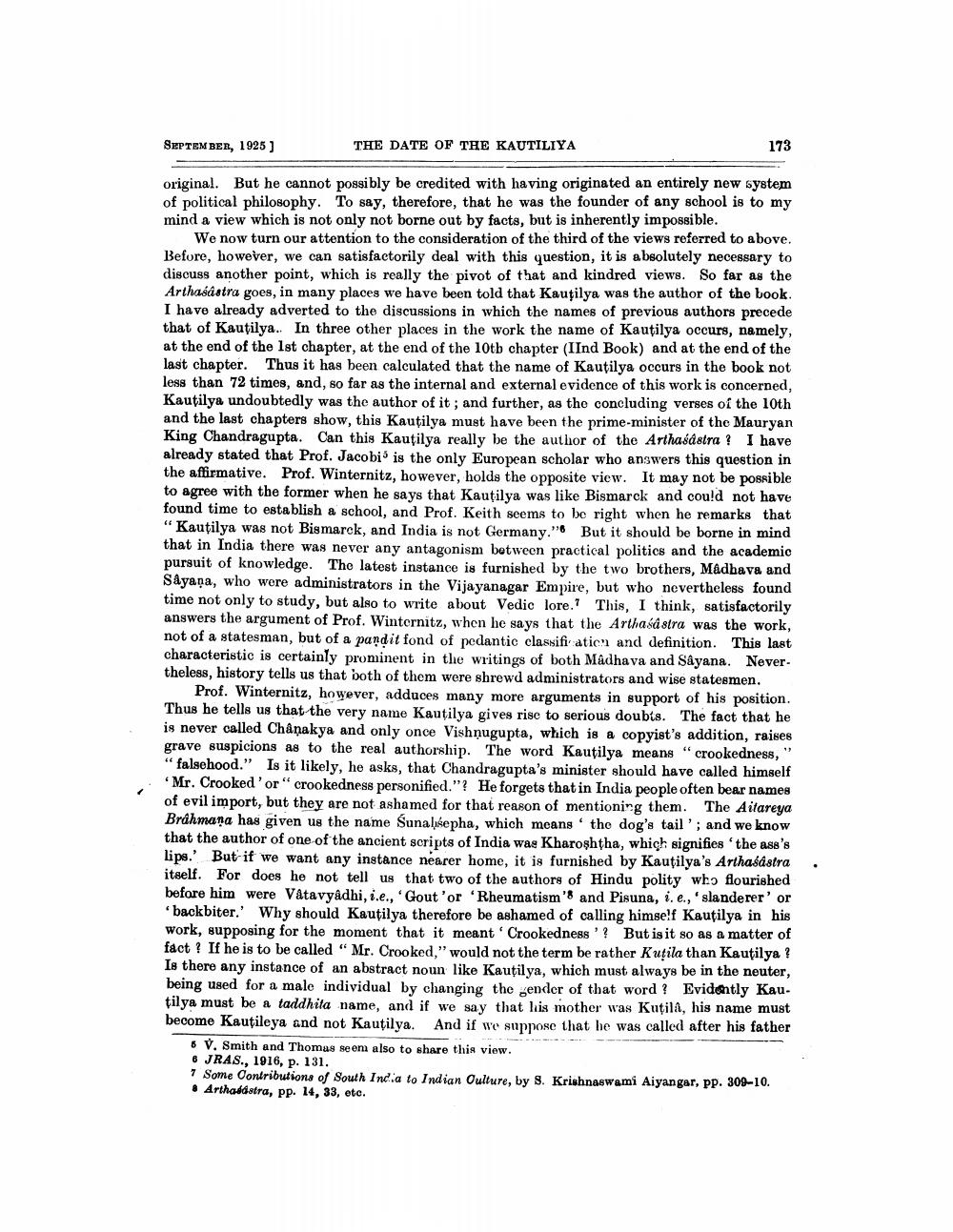________________
SEPTEMBER, 1925 )
THE DATE OF THE KAUTILIYA
173
original. But he cannot possibly be credited with having originated an entirely new system of political philosophy. To say, therefore, that he was the founder of any school is to my mind a view which is not only not borne out by facts, but is inherently impossible.
We now turn our attention to the consideration of the third of the views referred to above. Before, however, we can satisfactorily deal with this question, it is absolutely necessary to discuss another point, which is really the pivot of that and kindred views. So far as the Arthasastra goes, in many places we have been told that Kauțilya was the author of the book. I have already adverted to the discussions in which the names of previous authors precede that of Kautilya.. In three other places in the work the name of Kautilya occurs, namely, at the end of the 1st chapter, at the end of the 10tb chapter (IInd Book) and at the end of the last chapter. Thus it has been calculated that the name of Kautilya occurs in the book not less than 72 times, and, so far as the internal and external evidence of this work is concerned, Kautilya undoubtedly was the author of it; and further, as the concluding verses of the 10th and the last chapters show, this Kautilya must have been the prime minister of the Mauryan King Chandragupta. Can this Kautilya really be the author of the Arthasastra? I have already stated that Prof. Jacobi is the only European scholar who answers this question in the affirmative. Prof. Winternitz, however, holds the opposite view. It may not be posrible to agree with the former when he says that Kautilya was like Bismarck and could not have found time to establish a school, and Prof. Keith seems to be right when he remarks that "Kautilya was not Bismarck, and India is not Germany.' But it should be borne in mind that in India there was never any antagonism between practical politics and the academic pursuit of knowledge. The latest instance is furnished by the two brothers, Madhava and Sayaņa, who were administrators in the Vijayanagar Empire, but who nevertheless found time not only to study, but also to write about Vedic lore.? This, I think, satisfactorily answers the argument of Prof. Winternitz, when he says that the Arthasd stra was the work, not of a statesman, but of a pandit fond of pedantic classifi atic and definition. This last characteristic is certainly prominent in the writings of both Madhava and Sayana. Nevertheless, history tells us that both of them were shrewd administrators and wise stateemen.
Prof. Winternitz, however, adduces many more arguments in support of his position. Thus he tells us that the very name Kautilya gives rise to serious doubts. The fact that he is never called Chanakya and only once Vishnugupta, which is a copyist's addition, raises grave suspicions as to the real authorship. The word Kautilya means "crookedness," "falsehood.” Is it likely, he asks, that Chandragupta's minister should have called himself * Mr. Crooked'or" crookedness personified."? He forgets that in India people often bear names of evil import, but they are not ashamed for that reason of mentioning them. The Aitareya Brahmana has given us the name Sunalepha, which means the dog's tail'; and we know that the author of one of the ancient scripts of India wae Kharoshtha, which signifies 'the ass's lips.' But if we want any instance nearer home, it is furnished by Kautilya's Arthasástra itself. For does he not tell us that two of the authors of Hindu polity who flourished before him were Vatavyâdhi, i.e., 'Gout'or 'Rheumatism'8 and Pisuna, i e., 'slanderer' or "backbiter.' Why should Kautilya therefore be ashamed of calling himself Kautilya in his work, supposing for the moment that it meant Crookedness'? But is it so as a matter of fact? If he is to be called "Mr. Crooked," would not the term be rather Kutila than Kautilya ? Is there any instance of an abstract noun like Kautilya, which must always be in the neuter, being used for a male individual by changing the gender of that word ? Evidently Kau. tilya must be a taddhita name, and if we say that his mother was Kutil, his name must become Kautileya and not Kautilya. And if we suppose that he was called after his father
6 V. Smith and Thomas se em also to share this view. 8 JRAS., 1916, p. 131. 7 Some Contributions of South India to Indian Oulture, by S. Krishnaswami Aiyangar, pp. 309-10. # Arthaddatra, pp. 14, 33, etc.




